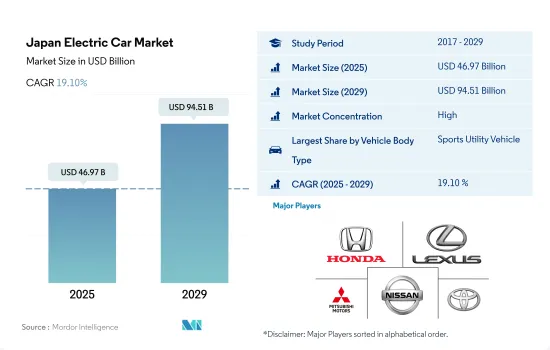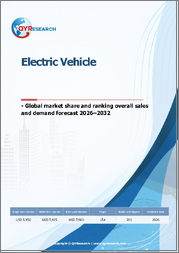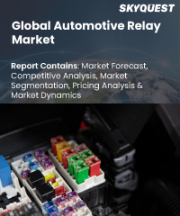
|
시장보고서
상품코드
1693641
일본의 전기자동차 시장 : 시장 점유율 분석, 산업 동향 및 통계, 성장 예측(2025-2030년)Japan Electric Car - Market Share Analysis, Industry Trends & Statistics, Growth Forecasts (2025 - 2030) |
||||||
일본의 전기자동차 시장 규모는 2025년에 469억 7,000만 달러로 추계되고, 2029년에는 945억 1,000만 달러에 이를 것으로 예측되며, 예측 기간 중(2025-2029년) CAGR은 19.10%를 나타낼 것으로 예측됩니다.

일본은 다양한 소비자 라이프스타일과 운전 선호도를 충족하기 위해 맞춤형 전기차를 제공하는 데 점점 더 집중하고 있습니다.
- 일본의 전기자동차(EV) 시장은 석유 수입을 줄이고 환경에 미치는 영향을 최소화하려는 일본의 노력에 힘입어 크게 성장하고 있습니다. 일본 정부는 2050년까지 일본 내에서 판매되는 모든 신차를 전기차 또는 하이브리드 차량으로 판매한다는 야심찬 목표를 세웠습니다.
- 해치백과 세단은 컴팩트한 크기와 효율성으로 인해 도심 환경에서 더 많이 사용되고 있으며, 상당한 점유율을 차지하고 있습니다. 한편, SUV는 다목적성과 편안함으로 인기를 얻고 있으며, 성능과 지속 가능성을 모두 추구하는 폭넓은 고객층에게 어필하고 있습니다.
- 그러나 일본의 전기차 시장 확대는 충전 인프라와 규제 장애물 등 난관에 직면해 있습니다. 높은 설치 및 운영 비용으로 인해 충전소 수가 감소하고 있으며, 고출력 충전기에 대한 엄격한 안전 규정으로 인해 더욱 악화되고 있습니다. 이러한 상황은 증가하는 전기차를 지원하기 위해 인프라에 대한 상당한 투자가 필요하다는 점을 강조합니다.
일본의 전기자동차 시장 동향
일본의 전기자동차 시장은 정부와 업계의 파트너십으로 점차 성장
- 일본의 전기차 산업은 점진적으로 성장하고 있으며, 2035년까지 모든 신차 판매를 전기화하겠다는 정부의 규범과 목표에 따라 일본이 전기 모빌리티로 전환하고 있습니다. 2021년 11월 일본 정부는 전기자동차에 보조금을 지급한다고 발표하였습니다.
- 다양한 기업들이 일본 전역의 다양한 분야에서 전기 이동성을 강화하기 위해 파트너십과 벤처를 체결하고 있습니다. 2022년 6월, 기술 기업 소니와 일본 자동차 제조업체 혼다는 전기 모빌리티를 함께 연구하기 위한 조인트 벤처를 체결했습니다. 이 벤처의 목표는 2025년까지 일본에서 전기차를 생산 및 판매하는 것입니다. 또한 혼다는 2030년까지 30종의 전기차를 출시하고 연간 200만 대의 전기차를 생산하겠다고 발표했습니다.
- 2022년 4월, 미국의 자동차 제조업체 제너럴 모터스는 혼다와 전기자동차 생산을 위한 파트너십을 확대한다고 발표했습니다. 파트너십 확장의 일환으로 두 회사는 자동차를 포함한 새로운 저렴한 전기자동차를 개발할 예정입니다. 차량 생산은 2027년 초에 시작될 예정입니다. 또한, 이러한 국제적인 확장은 새로운 디자인과 향상된 자동차를 개발할 것으로 예상되며, 이는 2024-2030년 일본 내 전기자동차 판매를 더욱 증가시켜 일본 전역의 배터리 팩 수요도 가속화할 것으로 예상됩니다.
일본의 전기자동차 산업 개요
일본의 전기자동차 시장은 상위 5개 기업이 113.79%를 점유하는 등 상당히 통합되어 있습니다. 이 시장의 주요 업체는 Honda Motor Co. Ltd., Lexus, Mitsubishi Motors Corporation, Nissan Motor Co. Ltd. and Toyota Motor Corporation 및 Toyota Motor Corporation(알파벳 순 정렬)입니다.
기타 혜택
- 엑셀 형식 시장 예측(ME) 시트
- 3개월간의 애널리스트 지원
목차
제1장 주요 요약과 주요 조사 결과
제2장 보고서 제안
제3장 소개
- 조사의 전제조건과 시장 정의
- 조사 범위
- 조사 방법
제4장 주요 산업 동향
- 인구
- 1인당 GDP
- 차량 구매를 위한 소비자 지출(CVP)
- 인플레이션율
- 자동차 대출 금리
- 공유 차량 서비스
- 전기화의 영향
- EV 충전소
- 배터리 팩 가격
- Xev 신모델 발표
- 중고차 판매
- 연료 가격
- OEM 생산 통계
- 규제 프레임워크
- 밸류체인과 유통채널 분석
제5장 시장 세분화
- 차량 구성
- 승용차
- 해치백
- 다목적 차량
- 세단
- SUV
- 승용차
- 연료 카테고리
- BEV
- FCEV
- HEV
- PHEV
제6장 경쟁 구도
- 주요 전략적 움직임
- 시장 점유율 분석
- 기업 상황
- 기업 프로파일
- Bayerische Motoren Werke AG
- Daihatsu Motor Co. Ltd.
- Daimler AG(Mercedes-Benz AG)
- Honda Motor Co. Ltd.
- Lexus
- Mazda Motor Corporation
- Mitsubishi Motors Corporation
- Nissan Motor Co. Ltd.
- Subaru Corporation
- Tesla Inc.
- Toyota Motor Corporation
- Volvo Car AB
제7장 CEO에 대한 주요 전략적 질문
제8장 부록
- 세계 개요
- 개요
- Five Forces 분석 프레임워크
- 세계의 밸류체인 분석
- 시장 역학(DROs)
- 출처 및 참고문헌
- 도표 일람
- 주요 인사이트
- 데이터 팩
- 용어집
The Japan Electric Car Market size is estimated at 46.97 billion USD in 2025, and is expected to reach 94.51 billion USD by 2029, growing at a CAGR of 19.10% during the forecast period (2025-2029).

Japan is increasingly focusing on customizing electric car offerings to cater to diverse consumer lifestyles and driving preferences
- The electric vehicle (EV) market in Japan is experiencing significant growth, driven by the country's efforts to reduce oil imports and minimize environmental impact. Japan's government has set ambitious goals, aiming for all new cars sold in the country to be electric or hybrid by 2050. This aligns with a global shift toward sustainable transportation, placing Japan as a pivotal player in the Asia-Pacific EV market. The market's expansion is evident in its value, which is expected to reach USD 43.32 billion in 2024, with a robust growth rate projected through 2029, highlighting Japan's commitment to transitioning toward electric mobility.
- Hatchbacks and sedans, being more common in urban settings due to their compact size and efficiency, have a significant share. Meanwhile, SUVs are gaining popularity for their versatility and comfort, appealing to a broader audience seeking both performance and sustainability. The market's composition reflects a diverse consumer preference, leaning toward a mix of practicality and eco-friendliness in vehicle choice.
- However, the expansion of Japan's EV market faces challenges, notably in charging infrastructure and regulatory hurdles. The number of charging stations has seen a decline due to high installation and operational costs, exacerbated by stringent safety regulations for high-output chargers. This situation underscores the need for substantial investments in infrastructure to support the growing number of EVs. Despite these challenges, opportunities abound, especially with Japan's push toward digital transformation and IoT connectivity in the automotive sector.
Japan Electric Car Market Trends
Japan's electric vehicle market grows gradually due to government and industry partnerships
- The electric vehicle industry in Japan is growing gradually, and the government's norms and targets to electrify all new car sales by 2035 are shifting the country toward electric mobility. Moreover, government efforts in terms of subsidies and rebates are driving the country's electric vehicle market. In November 2021, the government of Japan announced that it would provide subsidies on electric vehicles, i.e., up to USD 7200 per vehicle. However, hybrid vehicles are not included in the subsidy program. Such factors contribute to the growth of electric vehicles (passenger cars) by 11.11% in 2022 over 2021.
- Various companies are signing partnerships and ventures to enhance electric mobility in various sectors across Japan. In June 2022, the technology company Sony and the Japanese automaker Honda signed a joint venture to work on electric mobility together. The objective of the venture is to produce and sell electric cars in Japan by 2025. Moreover, Honda has announced the launch of 30 electric vehicles and the production of 2 million vehicles annually by 2030. Each company has invested approximately USD 37.52 million in the venture. Such factors are expected to impact electric mobility positively.
- In April 2022, the US-based automaker General Motors announced an expand its partnership with Honda to produce electric vehicles. As part of the expansion, the companies will develop new affordable electric vehicles, including cars. The production of the vehicles is expected to start in early 2027. Moreover, such international expansions are expected to develop new designs and enhanced cars, which further is expected to raise the sales of electric cars During the 2024-2030 period in Japan, which will also accelerate the demand for battery packs across Japan.
Japan Electric Car Industry Overview
The Japan Electric Car Market is fairly consolidated, with the top five companies occupying 113.79%. The major players in this market are Honda Motor Co. Ltd., Lexus, Mitsubishi Motors Corporation, Nissan Motor Co. Ltd. and Toyota Motor Corporation (sorted alphabetically).
Additional Benefits:
- The market estimate (ME) sheet in Excel format
- 3 months of analyst support
TABLE OF CONTENTS
1 EXECUTIVE SUMMARY & KEY FINDINGS
2 REPORT OFFERS
3 INTRODUCTION
- 3.1 Study Assumptions & Market Definition
- 3.2 Scope of the Study
- 3.3 Research Methodology
4 KEY INDUSTRY TRENDS
- 4.1 Population
- 4.2 GDP Per Capita
- 4.3 Consumer Spending For Vehicle Purchase (cvp)
- 4.4 Inflation
- 4.5 Interest Rate For Auto Loans
- 4.6 Shared Rides
- 4.7 Impact Of Electrification
- 4.8 EV Charging Station
- 4.9 Battery Pack Price
- 4.10 New Xev Models Announced
- 4.11 Used Car Sales
- 4.12 Fuel Price
- 4.13 Oem-wise Production Statistics
- 4.14 Regulatory Framework
- 4.15 Value Chain & Distribution Channel Analysis
5 MARKET SEGMENTATION (includes market size in Value in USD and Volume, Forecasts up to 2029 and analysis of growth prospects)
- 5.1 Vehicle Configuration
- 5.1.1 Passenger Cars
- 5.1.1.1 Hatchback
- 5.1.1.2 Multi-purpose Vehicle
- 5.1.1.3 Sedan
- 5.1.1.4 Sports Utility Vehicle
- 5.1.1 Passenger Cars
- 5.2 Fuel Category
- 5.2.1 BEV
- 5.2.2 FCEV
- 5.2.3 HEV
- 5.2.4 PHEV
6 COMPETITIVE LANDSCAPE
- 6.1 Key Strategic Moves
- 6.2 Market Share Analysis
- 6.3 Company Landscape
- 6.4 Company Profiles
- 6.4.1 Bayerische Motoren Werke AG
- 6.4.2 Daihatsu Motor Co. Ltd.
- 6.4.3 Daimler AG (Mercedes-Benz AG)
- 6.4.4 Honda Motor Co. Ltd.
- 6.4.5 Lexus
- 6.4.6 Mazda Motor Corporation
- 6.4.7 Mitsubishi Motors Corporation
- 6.4.8 Nissan Motor Co. Ltd.
- 6.4.9 Subaru Corporation
- 6.4.10 Tesla Inc.
- 6.4.11 Toyota Motor Corporation
- 6.4.12 Volvo Car AB
7 KEY STRATEGIC QUESTIONS FOR VEHICLES CEOS
8 APPENDIX
- 8.1 Global Overview
- 8.1.1 Overview
- 8.1.2 Porter's Five Forces Framework
- 8.1.3 Global Value Chain Analysis
- 8.1.4 Market Dynamics (DROs)
- 8.2 Sources & References
- 8.3 List of Tables & Figures
- 8.4 Primary Insights
- 8.5 Data Pack
- 8.6 Glossary of Terms



















